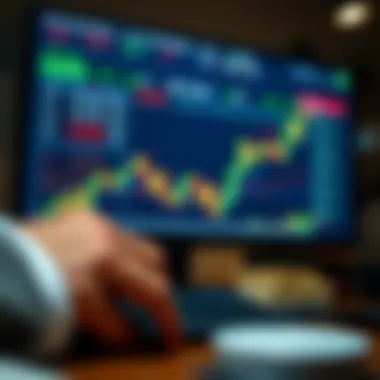Finding the Best Free Resources for Forex Education


Intro
In the fast-paced world of foreign exchange trading, having access to quality education can make the difference between a novice losing money and a trader finding success. That said, identifying resources for free forex trading education can feel a bit like searching for a needle in a haystack. There are countless platforms and materials available, but few stand out as truly effective.
In this guide, we'll take a closer look at various resources that offer free access to forex education. Not only will we evaluate the strengths and weaknesses of each resource, but we will also break down key concepts and terminologies that are vital for traders, whether they're just starting out or have some experience under their belt. This financial journey isn't just about charts and indicators; it’s also about understanding the landscape of the market and the tools at one’s disposal.
Key Components of Forex Education
Forex trading can be daunting, especially with the vast amount of information available. Whether it's platforms like BabyPips, which offers a structured learning path, or Investopedia, with its plethora of articles, the best resources have common characteristics that set them apart. We’ll also delve into the nuances of investment strategies and risk management, helping you gauge what might work best for your trading style.
Moreover, this article will underscore the importance of staying updated with market trends and adapting one's learning process accordingly. By the end of this piece, our aim is for readers to be well-informed about their options and feel more confident in their educational pursuits.
"Education is the passport to the future, for tomorrow belongs to those who prepare for it today." - Malcolm X
The Importance of Learning Forex
Engaging in forex trading without a solid educational foundation can lead to costly mistakes. As traders, it’s crucial to understand not only how to use tools and platforms but also to savor the knowledge of market behavior and economic indicators. Knowledgeable trading can transform strategies from mere guesswork to well-informed decisions, reducing the risks that come with the unpredictable nature of foreign exchange.
Let’s embark on this educational journey, unraveling the misconceptions and providing clear, actionable insights to elevate your forex trading experience.
Foreword to Forex Trading Education
In the intricate world of finance, understanding foreign exchange trading is not just beneficial; it’s essential. Forex trading, with its potential for profit and its inherent risks, underscores the need for well-grounded education. For anyone keen on entering this arena, finding the right educational resources is akin to laying a solid foundation for a house. Without proper knowledge, traders can often find themselves navigating through a treacherous landscape, swayed by impulsive decisions rather than informed strategies.
Understanding Forex Trading
Forex trading involves buying and selling currencies in pairs, and its appeal lies in the 24-hour market with high liquidity. A currency pair, such as EUR/USD, indicates how much of the quote currency (USD) can be bought with one unit of the base currency (EUR). This complexity requires traders to grasp not only the mechanics of trading itself but also the impact of geopolitical and economic factors on currency values. The knowledge gained through focused education can help traders interpret market trends, analyze data effectively, and apply various trading strategies.
Importance of Proper Education
When dipping one's toes in the forex pool, it’s easy to get overwhelmed by the vast ocean of information out there. However, the importance of a structured approach to education cannot be overstated. Here are some notable benefits:
- Enhanced Decision Making: Knowledge equips traders with the tools to analyze market conditions, helping them make reasoned decisions rather than emotional choices.
- Risk Management: An education that covers the intricacies of risk is invaluable. Understanding stop-loss orders, position sizing, and the significance of leverage are pivotal in safeguarding one’s investments.
- Skill Development: Forex trading is not just a matter of knowledge; it requires developing skills through practice and continuous learning. Proper education acts as a guide in honing these skills.
"A good trader learns to accept and manage risk more than a successful outcome; it's the journey through understanding that counts."
Investing time in the right educational resources fosters a culture of informed trading, which is essential for both novice and seasoned participants in the forex market. It equips them not just to react to market movements, but to anticipate and ideally position themselves ahead of trends. Without this, traders risk becoming part of the 90% who fail to consistently make profits.
In the sections that follow, we will delve into the various platforms available for forex trading education. By identifying the optimal resources, traders can chart a knowledgeable path through the complexities of forex trading.
Evaluating Free Forex Learning Platforms
When it comes to delving into the complexities of forex trading, the choice of learning platforms plays a pivotal role. Free forex learning platforms serve as gateways for traders at various levels of expertise. Each platform can offer distinct benefits, yet some might also harbor pitfalls that could mislead novice traders or overwhelm them with information. Thus, evaluating these resources becomes not just a trivial task, but a crucial step in anyone's educational journey.
Understanding the need for evaluation ensures that traders spend their time effectively. Newcomers might struggle with finding coherent information scattered across diverse sources, while seasoned participants may wish for advanced insights that align with their trading strategies. Evaluating platforms involves discerning not just the quantity of resources available, but their quality, accessibility, and relevance to individual learning goals.
Criteria for Selection
Evaluating the platforms means understanding the criteria that determine whether a resource is worthwhile. Here’s a breakdown of factors that can shape informed decisions:
- Content Quality: Is the information presented accurate, up-to-date, and insightful? Reliable sources help avoid pitfalls that can arise from outdated or incorrect info.
- User Engagement: Does the platform offer interactive features like quizzes and forums? Engaging tools can enhance understanding and retention of complex material.
- Community Support: A strong community can provide guidance and motivation. Look for platforms where users share experiences, tips, and the occasional reality check.
- Diversity of Learning Formats: Consider platforms that cater to different learning styles, whether via videos, written articles, or interactive simulations. Variety can enhance the learning experience.
By keeping these criteria in mind, individuals can focus on the resources that best suit their learning preferences and trading objectives.
Available Resources Overview
Navigating the landscape of free forex education can feel like searching for a needle in a haystack. To ease this process, it helps to categorize available resources into distinct groups. Here’s a glimpse into what's out there:
- Online Educational Platforms: Websites like BabyPips and Investopedia provide comprehensive guides and courses that cover everything from the basics to advanced strategies. They often feature articles, forums, and trading tools all in one place.
- YouTube Channels: Many educators and seasoned traders share their knowledge via YouTube. Channels like Trading 212 and The Trading Channel can enrich understanding through visual and practical examples.
- Blogs and Articles: Authentic and informed articles abound across several blogs dedicated to forex trading. Resources like DailyFX and Forex Factory offer insights, news updates, and market analyses that help traders remain informed.
- Demo Trading Accounts: Virtual trading platforms, like MetaTrader 4, allow traders to practice strategies without risking real capital. They help solidify the theoretical knowledge learned through various educational resources.
As one dives deeper into these resources, it’s critical to keep personal goals in the foreground, ensuring that educational journeys remain relevant and impactful.
Online Courses and Educational Websites
In the fast-paced world of forex trading, the quest for knowledge is paramount. Online courses and educational websites play a significant role in providing foundational insights and advanced strategies for traders at various skill levels. These platforms serve as a bridge, guiding novices and seasoned investors alike through the intricate mechanics of currency markets. With the right resources, traders can bolster their understanding, elevate their trading prowess, and navigate the complexities of foreign exchange with confidence.


Popular Free Educational Websites
There’s no shortage of websites out there offering free educational content on forex trading. But sifting through the noise to find reputable sources can be like searching for a needle in a haystack. Here’s a selection of noteworthy platforms that stand out due to their reliability and depth of content:
- Babypips: Known for its simplified yet comprehensive approach, Babypips is often deemed the gold standard for beginner forex education. Their "School of Pipsology" provides structured lessons coupled with practical real-world applications.
- Investopedia: This platform is a longstanding titan in financial education. Investopedia features a plethora of articles, guides, and tutorials that cover diverse aspects of forex trading, making it a favorite among both beginners and experienced traders.
- Forex Factory: While primarily a forum for traders to discuss strategies, Forex Factory also has a wealth of educational resources. Users can access insightful articles on various trading techniques and market trends, creating a community-driven knowledge base.
Exploring these websites may provide the foundational knowledge required to tackle the complexities of forex trading. They present varying perspectives that cater to different learning preferences, ensuring there’s something for everyone.
Accredited Online Courses
While many free resources can enhance your forex trading skills, accredited online courses take things a step further. These courses often offer deep dives into specific topics and come with the credibility of established institutions. Completing them not only adds to your skill set but can also enhance your professional credibility.
Many universities and online learning platforms now offer free or low-cost accredited courses. For instance:
- Coursera: Partnering with recognized universities, Coursera provides courses that are not just informative but come with credible certifications upon completion. Courses on trading finance and analysis enable participants to understand economic indicators and their impact on currency values.
- edX: Similar to Coursera, edX features a range of courses from university affiliates. You can find courses related to financial markets, offering structured paths that cover essential concepts necessary for effective forex trading.
- Khan Academy: Though broader in focus, Khan Academy does include financial literacy modules that can aid in understanding fundamental economic principles that underpin forex trading.
These accredited courses often incorporate elements like quizzes, community discussions, and expert feedback, enriching the learning experience. Investing time in structured learning pathways can create a solid foundation for your trading career.
***"Knowledge is like money; to be of value, it must be used."
Engaging with online courses and educational websites is an excellent strategy for anyone serious about making strides in forex trading. Leveraging these valuable resources can pave the way for informed decision-making and fruitful trading endeavors.
YouTube Channels Dedicated to Forex Education
The landscape of forex trading education has evolved dramatically, and one of the most accessible mediums for learning is undoubtedly YouTube. This platform hosts a myriad of channels dedicated to forex education, catering to a diverse audience ranging from absolute beginners to seasoned traders. The instant accessibility of video content allows learners to absorb complex concepts visually, often in formats that are easier to digest than text-based resources. Additionally, the opportunity for engagement in the comments section can offer insights from peers and even direct responses from content creators, establishing a more interactive learning environment.
Assessing Quality of Content
When selecting YouTube channels for forex education, it is imperative to scrutinize the quality of content. Not all that glitters is gold, as they say. Here are several elements to consider:
- Credibility of the presenter: Evaluate the background of the content creator. Are they experienced traders? Do they have formal education in finance or trading? A credible presenter will not only share strategies but will also educate viewers on the principles behind them.
- Clarity and coherence: The ability to explain complex ideas in a straightforward manner is essential. Pay attention to how well the presenter structures their videos and whether they take time to summarize key points.
- Engagement with the audience: Notice if the creator encourages questions and interacts with comments. This can be indicative of a willingness to help learners and clarify doubts, enhancing the overall value of the channel.
- Consistency of uploads: A channel that regularly updates its content signals active engagement and commitment to providing fresh insights and relevant information.
"Education is not filling a bucket, but lighting a fire." This phrase rings particularly true for self-directed learning in forex trading. The right YouTube channel can indeed spark an enduring interest and deeper understanding of the market.
Examples of Notable Channels
In the vast ocean of YouTube, certain channels stand out for their dedication to providing top-tier forex education. Here are a few that have garnered respect within the trading community:
- ForexSignals TV: Known for offering in-depth analysis and trading psychology tips, this channel combines educational content with market commentary, making it a staple for many learners.
- The Trading Channel: This is another excellent resource focusing on practical, no-nonsense trading strategies. It emphasizes technical analysis and often shares real-time trading sessions.
- A1 Trading: A channel that features a team of traders offering insights, webinars, and live trading sessions, allowing viewers to witness trading in action and understand decision-making.
- Rayner Teo: Rayner is well-known for his straightforward strategies and approachable teaching style. His videos cover essential topics while keeping novices engaged and informed.
These channels, among others, provide a robust foundation for expanding your forex trading knowledge.
Forex Trading Forums and Communities
Exploring the world of forex trading can often feel like wandering in a maze, especially for newcomers. In this context, Forex trading forums and communities stand as invaluable beacons of light. They provide not just information, but also a sense of belonging among traders of varied experience levels. These forums foster an environment where individuals can share insights, trade ideas, and broaden their understanding of complex market dynamics. The nature of forex is such that it thrives on shared knowledge; hence, tapping into community wisdom can significantly enhance one’s trading acumen.
The Value of Community Learning
Learning from others is often more effective than solitary study. In trading, this principle is magnified manifold. When individuals engage in forums, they gain access to a plethora of experiences and strategies that they could not acquire alone. Many traders may find themselves pondering challenging questions that others have already explored. Whether a trader is attempting to decipher market trends or grappling with technical analysis, the collective knowledge found in trading communities can illuminate the path ahead.
Furthermore, these forums provide emotional support. The journey of trading is rife with ups and downs, where encouragement from fellow traders can help maintain morale. Often, it’s comforting to know that others are facing similar challenges. Asking questions or sharing experiences in these communities can turn what often feels like a daunting endeavor into a more manageable and less isolated experience.
"In the world of trading, it pays to surround yourself with a network of informed peers."
Identifying Reputable Forums
Navigating through various forex forums can be overwhelming with numerous options available. Identifying reputable forums is critical for ensuring that the information gathered is trustworthy. Here are some criteria to consider:
- Activity Level: A lively forum with frequent posts indicates an engaged community. Regular discussions and questions suggest that users find value in participating.
- Moderator Presence: Forums moderated by knowledgeable individuals can maintain respectful discourse and reduce the spread of misinformation.
- Quality of Discussion: Focus on forums where discussions delve into insightful analysis rather than mere hype about currency pairs. High-quality exchanges will often provide depth in trading strategies and technical indicators.
- User Feedback: Take note of how users respond to queries. Positive responses and constructive critiques can indicate a worthwhile space.
Some examples of reputable forums include the Forex Factory, known for its extensive resources and live discussions, and BabyPips, which offers a wealth of educational material alongside community interaction. Additionally, participating in platforms like Reddit’s r/Forex can provide diverse perspectives and real-time updates on market sentiment.
Incorporating these considerations will aid traders in pinpointing the most valuable forums, ensuring their learning experience is enriched and structured towards success.
Free Educational Blogs and Articles
Free educational blogs and articles serve as a vital cornerstone in the landscape of forex trading education. As the saying goes, knowledge is power, and these resources empower traders by breaking down complex concepts, offering insights, and keeping them updated on market trends. They cater to various learning styles and preferences, making it easier for individuals to engage with the material.


Blogs often provide a unique blend of personal experience and analytical content, allowing readers to grasp real-world implications of trading strategies, market behavior, and economic indicators.
Finding Credible Blogs
In the vast ocean of information online, identifying credible blogs can feel like searching for a needle in a haystack. Many individuals may stumble upon blogs that offer either overly promotional content or are not updated regularly. Hence, it's pivotal to focus on a few critical criteria when searching for trustworthy resources. Look for:
- Author Expertise: Check if the writer has a background in finance or trading. Their qualifications can affect the reliability of the content.
- Publication Frequency: A blog that is frequently updated with fresh content is likely more relevant and in sync with current market conditions.
- Reader Interaction: Comments and discussions can be a good gauge of the blog's credibility. Engaged readers often share valuable insights or question the material presented.
Some notable blogs worth exploring include:
- DailyFX - Comprehensive market analysis and educational content.
- Investopedia - Offers a range of articles from basics to advanced trading strategies.
- BabyPips - The Forex School is a good start for beginners, providing structured learning.
Evaluating Article Quality
Not all articles are created equal. In fact, the quality of the articles you read can significantly influence your understanding of forex trading. Here's how to gauge whether an article deserves your time:
- In-Depth Analysis: Quality articles typically dive deep into specific topics, rather than skimming the surface. Look for pieces that break down strategies, analyze current market events, or explain economic theories.
- Clear Citations: Reliable articles should cite credible sources, whether that's data from financial institutions, government stats, or academic research. This adds weight to the claims made.
- Practical Application: A good article often provides actionable insights—this means that rather than just theory, it teaches you how to apply the information in real trading scenarios.
Simulation and Demo Trading Accounts
When it comes to mastering the intricate world of forex trading, one cannot underestimate the pivotal role that simulation and demo trading accounts play. These accounts act as the bridge between theoretical knowledge and actual trading practices, providing a safe and risk-free environment to hone skills. With the unpredictable ebb and flow of currency markets, utilizing these tools can significantly enhance a trader's readiness and confidence.
Benefits of Hands-On Practice
Hands-on practice is the cornerstone of effective learning in any field, especially in forex trading. By engaging with a demo account, traders can:
- Experiment Freely: Newbies often hesitate to make bold moves due to fear of losses. A demo account allows them to try various strategies without the pressure of financial loss. Practicing different strategies allows one to find out what works best for their trading style.
- Understand Market Dynamics: Trading is much more than just executing buys or sells. With a simulation account, traders can observe how economic factors affect currency values, giving valuable insights into market dynamics that textbooks may not cover.
- Test Emotional Control: Trading can provoke a range of emotions—fear, greed, and excitement. Using a demo account allows individuals to experience these emotions in real-time while developing a more disciplined approach.
- Refine Technical Skills: Navigating trading platforms, utilizing various analytical tools, and developing an understanding of chart analysis become second nature when practiced regularly in a simulated environment.
Here, the principle of "practice makes perfect" rings true. Each trade placed on a demo account can yield knowledge and experience, paving the road to a more informed and strategic approach in real trading situations.
Select Platforms Offering Free Trials
Not all platforms are created equal, so it’s crucial to choose the right ones if you’re aiming to get the most out of your free educational experience. Here are a few noteworthy platforms offering robust demo accounts:
- MetaTrader 4: Often considered the gold standard, it provides a customized experience with a variety of tools for both beginners and advanced traders.
- cTrader: Known for its user-friendly interface, cTrader offers a demo account with access to market analysis tools and advanced trading features.
- TD Ameritrade's thinkorswim: This platform not only allows for demo trading but also offers educational resources that enhance the learning experience.
- Interactive Brokers: Their demo account allows you to practice with real market data, giving traders the chance to familiarize themselves with market behavior.
- eToro: Primarily a social trading platform, eToro's demo account enables users to learn from more experienced traders while practicing in a risk-free environment.
Using these platforms, traders can not only practice their skills but also identify which tool aligns best with their trading style and needs. By leveraging the opportunity presented by these demo accounts, one can enhance their trading capabilities significantly.
"The best way to predict the future is to create it." - Peter Drucker
Utilizing Free Trading Tools
In the realm of forex trading, knowledge is power, but it’s the tools in your arsenal that can make or break your trading journey. Utilizing free trading tools is paramount for both novice traders and seasoned veterans wanting to sharpen their skills. They not only help one stay updated with market trends but also play a crucial role in analyzing data efficiently. For someone navigating the intricate waters of forex, these tools can offer a lifeline, guiding decisions that could turn the tide in favor of profitability.
Foreword to Analytical Tools
Analytical tools are the backbone of informed trading decisions. They come in various forms, from simple charting software to complex technical analysis programs. By leveraging these resources, traders can gain insights into price movements, market trends, and potential entry or exit points.
- Charting Software: Programs like TradingView allow users to visualize market data, offering customizable charts and tools that assist with technical analysis.
- Market News Aggregators: Tools such as Forex Factory provide real-time news updates and economic calendars. Staying abreast of global events is vital as market sentiment can shift dramatically based on news.
- Backtesting Software: These tools let users test trading strategies against historical data, helping traders to refine their approaches before risking real capital.
By incorporating analytical tools into your forex education, you equip yourself with the necessary skills to interpret market signals and make reasoned decisions.
Comparing Free Tools
When looking at free trading tools, it’s important to understand that not all are created equal.
"Quality often trumps quantity when evaluating your trading resources."
- Functionality: Some tools like MetaTrader 4 offer a wide range of features like automated trading, while others might only have basic functionalities.
- User Interface: An intuitive UI can greatly enhance the learning curve for beginners. It's better to choose a user-friendly tool rather than one packed with features that's hard to navigate. Examples include NinjaTrader and Thinkorswim.
- Community and Support: Platforms with active user forums can be invaluable. Websites such as Reddit or specialized forex forums often have discussions where traders share experiences about different tools.
- Updates and Maintenance: Tools that receive frequent updates usually adapt faster to changing market conditions. Investigate how often the tool's developers release updates to ensure you’re using the best available version.
In making comparisons, consider the aspects that align best with your trading style and educational needs. Look for those resources that not only meet your immediate requirements but also have the potential to evolve alongside your growing understanding of forex trading.
Critical Considerations When Choosing Resources
When it comes to free forex trading education, making informed choices about resources can significantly shape one's learning experience. It is easy to get swept up by a plethora of options, but without a keen critical eye, one might end up wasting precious time on less effective material. Thus, honing in on certain considerations is crucial for optimizing the education journey in foreign exchange trading.


Recognizing Quality over Quantity
In a world where information is as abundant as grains of sand, the age-old adage rings true: "Less is more." This couldn’t be more relevant in the realm of forex education. Instead of trying to devour every resource in sight, the focus should be on discerning the quality of the content you're engaging with.
Quality resources often come from established experts or reputable institutions. Look for educational content with:
- Proven track records: Resources that have helped many learners with tangible outcomes.
- Accurate and up-to-date information: Markets change rapidly, so staying current is key.
- Clear, structured layouts: Well-organized information enhances comprehension and retention.
Going for quantity may lead to superficial understanding. Traders may end up with a mishmash of ideas that do not connect cohesively. Instead, find a few high-caliber resources, such as forex education platforms or well-reviewed books by experts, that delve deeply into the material. Prioritize comprehensive guides that cover both fundamental and technical aspects of forex trading. Remember, it’s not about how much you know, but how effectively you can apply what you learn.
Understanding Diverse Learning Styles
Every individual absorbs information differently. Some might learn best through visual means, while others prefer hands-on experiences. Recognizing your own learning style can be pivotal in selecting effective educational resources.
Here are the prevalent learning styles and how they can find expression in forex education:
- Visual learners: They benefit from charts, graphs, and video tutorials. Platforms like YouTube or sites featuring rich visuals can assist these learners significantly.
- Auditory learners: Such individuals may prefer podcasts or discussion-based formats. Engaging in webinars or listening to trading experts on various subjects can foster better understanding.
- Kinesthetic learners: These traders often thrive with interactive learning methods. Utilizing demo accounts with platforms like OANDA or MetaTrader allows them to practice what they’ve learned.
Many free resources blend these styles, but it’s wise to choose those that align with your preferences. Tailoring education to your learning style may enhance retention rates, making you more adaptable in the fast-paced world of forex trading. As you explore, keep an open mind, adapt your strategy, and adjust your toolkit according to what works best for you in your trading education journey.
"Education is not the filling of a pail, but the lighting of a fire."
Setting Realistic Goals in Forex Education
Establishing a clear direction in forex education is crucial for anyone looking to navigate this complex market. Setting realistic goals not only provides a roadmap for your educational journey but also ensures that you remain focused and motivated as you progress. If you don’t know where you’re heading, every bump in the road can feel like a dead end. Here, we dive into the various elements that embody goal-setting in forex education, its benefits, and shapes your overall success.
Establishing Milestones for Learning
Creating milestones offers a structured approach to learning, breaking down the massive topic of forex trading into bite-sized pieces. Think of it like planning a trip; you wouldn’t just hop in the car without knowing where to stop along the way for gas or food. Each milestone could represent different aspects of forex trading, such as:
- Understanding Currency Pairs: Familiarize yourself with how major and minor currency pairs work before diving into trading.
- Learning Technical Analysis: Develop proficiency in using charts and indicators, which are vital to making data-driven decisions.
- Practicing on Demo Accounts: Use simulation tools to apply your knowledge in a risk-free environment.
By breaking your educational process into these achievable milestones, you can celebrate progress, which boosts your confidence and keeps you motivated. Each success reinforces your commitment to learning, and the excitement of hitting these targets makes the often daunting task of learning forex much more engaging.
Monitoring Progress and Adaptation
Once you’ve set your sights on your educational goals, the next step is to monitor your progress and be flexible enough to adapt as necessary. Forex trading is ever-evolving, just like the markets themselves. A strategy that works today may not be effective tomorrow due to changing economic factors.
Regularly assess whether you’re on track. Assessments can be made through various methods, like:
- Journaling Your Trades: Documenting your trades helps you understand your decision-making process and where changes might be needed.
- Reviewing Content Consumption: Track which educational resources you’ve utilized. Are they providing the clarity you need?
- Feedback from Community: Engaging with forums on platforms like Reddit can provide insights and alternative perspectives that may enhance your learning.
By maintaining an adaptable mindset towards your educational goals, you help ensure that you stay relevant and up-to-date, equipping yourself with the knowledge and skills necessary to thrive in forex trading. As the landscape changes, being willing to refine your goals and practices will help you not just keep pace but potentially get ahead of the curve.
"The key is not to prioritize what's on your schedule, but to schedule your priorities." – Stephen Covey
By being intentional about your learning trajectory, you’re laying the groundwork for a successful experience in forex trading, making it easier to adapt to challenges along the way. Keeping a flexible mindset towards your educational path can make all the difference. In essence, setting and revising your goals is akin to adjusting your sails in response to changing winds; it’s essential for navigating successfully through the waters of forex education.
Ending: Crafting an Informed Learning Path
In the realm of forex trading, the journey of education is as crucial as the act of trading itself. Closing out this article, we need to focus on what it means to craft an informed learning path. The importance lies not merely in accumulating information but in understanding how to utilize that knowledge effectively. Each resource discussed earlier has its unique strengths and weaknesses, making it imperative for learners to identify what aligns best with their individual goals and preferred learning styles.
Navigating through free forex education platforms can feel like wading through a dense fog; clarity is essential. Here’s what to remember:
- Personal requirements: What you need to learn might differ from the resources available. Identify accurate materials that address your current skill level.
- Diverse approaches: Embrace various learning methods, be it through videos, articles, or forums. Different perspectives can provide richer understanding.
- Realistic application: Knowledge is one thing, but applying it in practice is another. This journey requires not just reading but also engaging with the materials actively.
This phase of formulation is where learning transitions into strategy. When traders become well-versed in the key principles and intricacies of trading, their paths become less convoluted. By taking the time to create a solid foundation, traders equip themselves to approach the forex market with confidence and competence.
Summarizing Key Learning Points
As we bring things to a close, let’s recap some of the fundamental insights drawn from our exploration:
- Comprehension is key: It’s not enough to skim through content; a deep understanding fosters better decision-making.
- Resource evaluation: Assessing various resources based on credibility, content quality, and relevance can dramatically impact the learning outcome.
- Continual feedback: Engaging with communities ensures that you're not alone in your education. Feedback from peers can help in refining strategies and understanding market nuances.
- Application of knowledge: Practicing what you’ve learned through demo accounts or theoretical scenarios will reinforce concepts and strategies.
"Success in forex trading is not just measured by profits but by the depth of knowledge and strategy developed along the way."
Emphasizing Continuous Improvement
Education in forex trading is not a one-time endeavor but rather a lifelong pursuit. The market is perpetually evolving, and with it, the methodologies and strategies that traders must employ. Here are some considerations that underline the importance of continuous improvement:
- Adaptation to Market Trends: Staying attuned to market developments and adjusting learning material accordingly is crucial. Resources often change based on market behavior.
- Lifelong Learning: Committing to learning even after establishing a foundational knowledge base ensures that traders remain competitive.
- Networking: Building connections with other traders, attending webinars, and participating in discussions can significantly enhance individual growth.
- Reflective Practice: Taking time to reflect on successes and failures cultivates a deeper understanding of personal trading styles and decisions.
By integrating these aspects into your educational journey, you'll create a sustainable path to success in the forex trading arena. Remember, it’s all about progress, not perfection.



